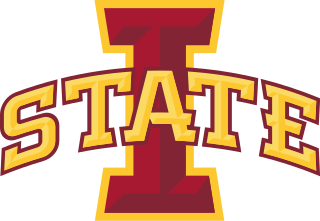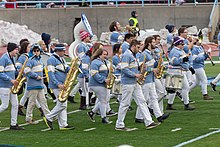The Virginia Pep Band was a student-run musical ensemble at the University of Virginia (UVA). In the tradition of scatter or scramble bands, like those at Stanford, Rice and the Ivy League, the Pep Band preferred irreverent humor and individuality to marching in uniform formations. Founded in 1974, this group of students served as UVa's band supporting athletics in an official capacity until 2003. After being banned from official athletic events in 2003, the group continued to perform at sporting events such as swimming, field hockey, and ice hockey. The ensemble has also performed at Charlottesville community events including the Charlottesville 10-miler, the Alzheimer's Walk, and the United Way Day of Caring.
The Marching Owl Band is the Rice University "marching band" in the sense that it is the official ensemble that performs during football games, some basketball games, parades, and other public events. There are over 100 members. However, the MOB is not a traditional marching band, but rather a scatter band; members do not march, and some members play non-standard instruments. For example, in recent seasons these instruments included violins, violas, a cello, electric guitar, electric bass, electric piano, and even a harp. Extras known as Show Assistants are also a perennial inclusion in the MOB; these students play no instruments besides the kazoo, but are responsible for constructing and employing props in the halftime shows and acting out any mime or gag bits during performances. Rather than wear traditional marching band attire, The MOB instead dons pinstriped three-piece suits, ties, sunglasses, fedoras, and tommy gun props. The group is known for satirical football halftime shows which, as MOB director Chuck Throckmorton says, poke fun at rival universities' sacred cows.

The Cavalier Marching Band (CMB) is the marching band at the University of Virginia. The band's original director, William "Bill" Pease, was the first full-time marching band director in the history of the University of Virginia. The Cavalier Marching Band made its debut on September 11, 2004, after a considerable donation was made by University of Virginia benefactors Carl and Hunter Smith to found the band in 2003. The CMB uses a mixture of both DCI-style glide step and Big Ten-style high step in its performances. Of its 200 members, all seven undergraduate schools at the University of Virginia are represented.

The Princeton University Band serves as the official marching band and pep band of Princeton University. Like most other Ivy League bands, it is a scramble band. To members and fans, it is often known as the PUB or simply The Band. Many alumni refer to it as the Tiger Band.

The Columbia University Marching Band (CUMB) was the marching band of Columbia University. The CUMB, which was entirely student-run, had a reputation for edgy humor and was known for playing infamous pranks. In 2019, the band was officially banned from Columbia athletic events and its funding revoked. In 2020, following allegations of inappropriate behavior, the band voted to disband itself. In 2022, Columbia Athletics launched a new spirit band, under the supervision of a band director employed by the university.

The Harvard University Band (HUB) is the official student band of Harvard University. The Harvard Wind Ensemble, the Harvard Summer Pops Band, and the Harvard Jazz Bands also fall under the umbrella organization of HUB. Currently, the band plays for all football games as well as home men's and women's ice hockey games. Occasionally it plays at men's and women's basketball games. The uniform for both football games and other formal appearances consists of a crimson wool HUB blazer worn over a white shirt with a black HUB logo tie, black pants, and black shoes. In the early days of the Band, white sailor hats and khaki pants were worn. For hockey games, the band wears a custom Harvard Band hockey jersey, modeled after the home jerseys for men's hockey, which features images of Bertha on the sleeves. Band alumni, known as crusties, maintain strong ties to the HUB, sometimes continuing to act as regular members well after graduating from the university. Illegitimum non carborundum (INC) is the HUB motto. Written correspondence from HUB or HUB members is frequently signed with INC.

The Cornell Big Red Marching Band is the only corps style marching band in the Ivy League. It performs at all home, and most away, Cornell Big Red football games. In addition, the band has performed at halftime for numerous National Football League and Canadian Football League games, and began a tradition of an annual Spring Concert in 2006. Since 1972, the band has held a bi-annual march in New York City which takes place on dates when the Cornell football team travels to Columbia, known as the Sy Katz '31 Parade.

The University of Minnesota Marching Band is the marching band of the University of Minnesota and the flagship university band for the state of Minnesota. The Pride of Minnesota serves as an ambassador for the university, representing the school at major events both on and off campus. The band performs before, during, and after all home Golden Gopher football games and bowl games, occasional away games, local parades, numerous pepfests, exhibition performances, as well as a series of indoor concerts toward the end of the regular football season. Members of the band, along with non-member students, also participate in smaller athletic pep bands that perform at other major sporting events, including men's hockey, men's basketball, women's hockey, women's basketball, and women's volleyball.
The University of Pittsburgh Varsity Marching Band, or Pitt Band, is the college marching band at the University of Pittsburgh. The band numbers over 300 students consisting of instrumentalists, a majorette squad known as the Golden Girls, a color guard, and the drumline. The band was founded in 1911 and has won numerous awards over the years. All members of the band must pass an audition in order to join. The band is currently housed in Trees Hall; however, in 2020, the Pitt Athletic Department announced its "Victory Heights" initiative, part of the campus master plan which includes a new marching band facility slated to open in spring 2027.

The Iowa State University Cyclone Marching Band is the marching band of Iowa State University. Composed of two ensembles, the Iowa State University Cyclone Football 'Varsity" Marching Band (ISUCF'V'MB) and State Storm, the band performs in support of the Iowa State Cyclones football team at all home games and at some away games versus Big 12 Conference rivals. Nicknamed the "Pride of Iowa State", the "Best of the Midwest", and the "Varsity Band," the band plays at high school band festivals, indoor concerts, and post-season bowl games.

The Herd of Thunder is the name for the athletic bands of the University of South Florida, which includes the show band, "Rumble" pep band, and marching band ensembles, although it is often used to refer simply to the Marching Band. The Herd of Thunder was founded in 1999, two years after USF fielded its first football team.

Oregon State University Marching Band, ("OSUMB"), is the marching band of Oregon State University, known as the "Spirit and Sound of OSU." The band was established in 1891. It is one of the oldest bands in the Pac-12 and the primary athletic band at Oregon State. In addition to the Oregon State University Marching Band, other athletic bands include Basketball Band, Rhythm & Beavs, Rhythm & Beavs: Travel Band, the Away Game Pep Band, Alumni Band, Gymnastics Band, and Bar Band. All band members are required to participate in marching band before they may be eligible to participate in any of the other athletic bands Oregon State offers.

The Thunder of the East is the marching band of the University at Buffalo in the State University of New York system. UB's first marching band was created in 1920, and disbanded in 1927. It was revived in 1946, increasing in size and reputation until about 1970. It was known as "The Pride of the East." At that time, it was dissolved upon UB's departure from Division I athletics. In 1981, some UB students continued the tradition of playing music at UB's home football and basketball games by forming UB's Pep Band. In anticipation of UB's return to Division I athletics, a marching band was formed in 1999 and named, "Thunder of the East." The band debuted at the University at Buffalo Stadium on September 11, 1999. The Thunder of the East is currently led by James E. Mauck; and performs at UB's Buffalo Bulls home football games, as well as in other musical venues.
The Georgia Redcoat Marching Band, commonly referred to as "The Redcoats", is the official marching band of the University of Georgia.

The Band of the Fighting Irish is the marching band of the University of Notre Dame. Over 300 members of the band represent nearly every field of study, and include students from across the United States as well as from overseas. The Band of the Fighting Irish is composed of students from the University of Notre Dame, Saint Mary's College, and Holy Cross College. Founded in 1845, it is the oldest university marching band.

The Tulane University Marching Band (TUMB) is the marching band of Tulane University. It performs at every Tulane Green Wave football home game in Yulman Stadium, bowl games, and some away games. It is also marches in New Orleans Mardi Gras parades each year, having appeared in Le Krewe d'Etat, the Krewe of Thoth, the Krewe of Bacchus, and the Krewe of Rex, among others.

The Tiger Pep Band at DePauw University (TPB) is a student-led, -organized, and -funded ensemble at DePauw University in Greencastle, Indiana. The band has been recognized several times among the best in collegiate sports, promoting sportsmanship and civility, and has been hailed as "best pep band in Division III athletics ".

The Gold Star Marching Band or also known as "The Pride of North Dakota" is the marching band of North Dakota State University. It is a non-auditioned band, open to all majors. With approximately 170 members, the band is one of the largest organizations on campus.
The Marching Salukis is the official marching band of Southern Illinois University Carbondale. Composed of men and women, the band performs at all SIU football home games and marches in parades for SIU homecoming, the Du Quoin State Fair and Carbondale Lights Fantastic. The band has also performed in halftime programs for the Chicago Bears, St. Louis Cardinals, Green Bay Packers and St. Louis Rams, as well as presidential addresses in Carbondale by Bill Clinton.

The Ohio State University Athletic Band is a non-audition band for any student, faculty, or staff of Ohio State University with prior instrumental experience. Many students who perform in the Athletic Band also perform in the Ohio State University Marching Band. Each Athletic Band features full contemporary concert band instrumentation, including woodwinds. It performs throughout the year at various athletic and goodwill functions across campus. Members of the Athletic Band receive course credit for their band participation.















